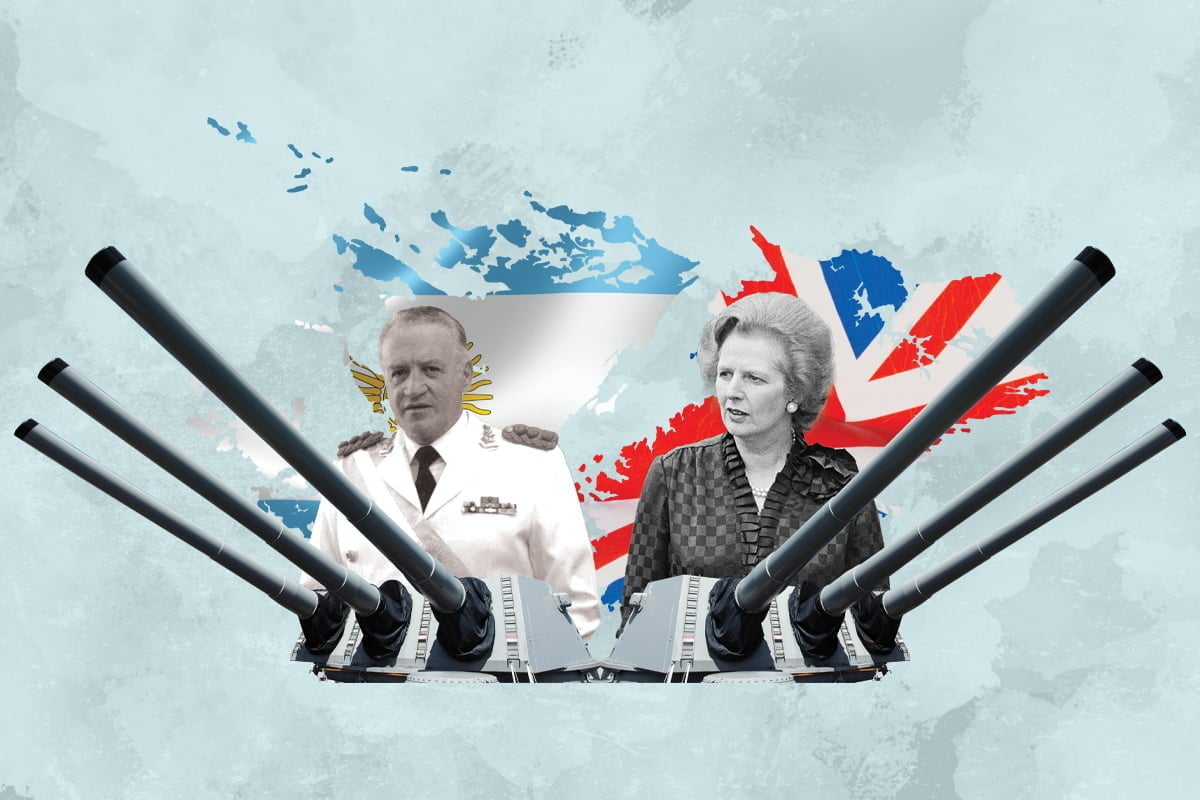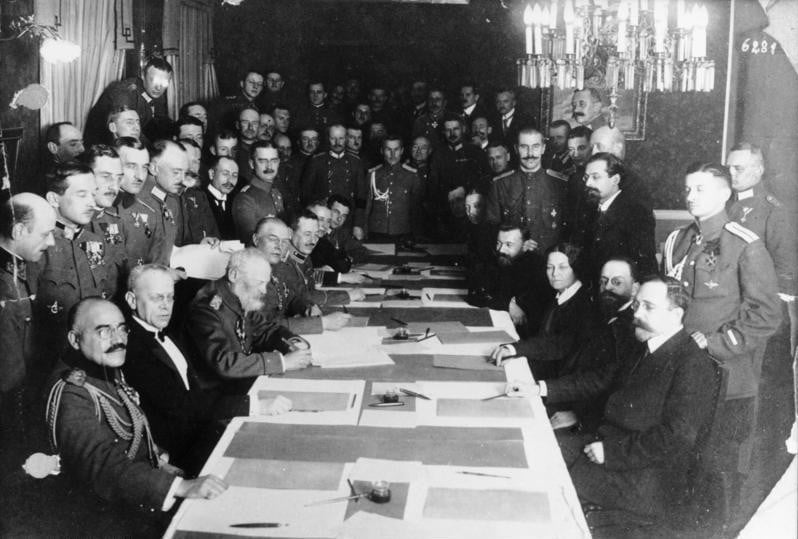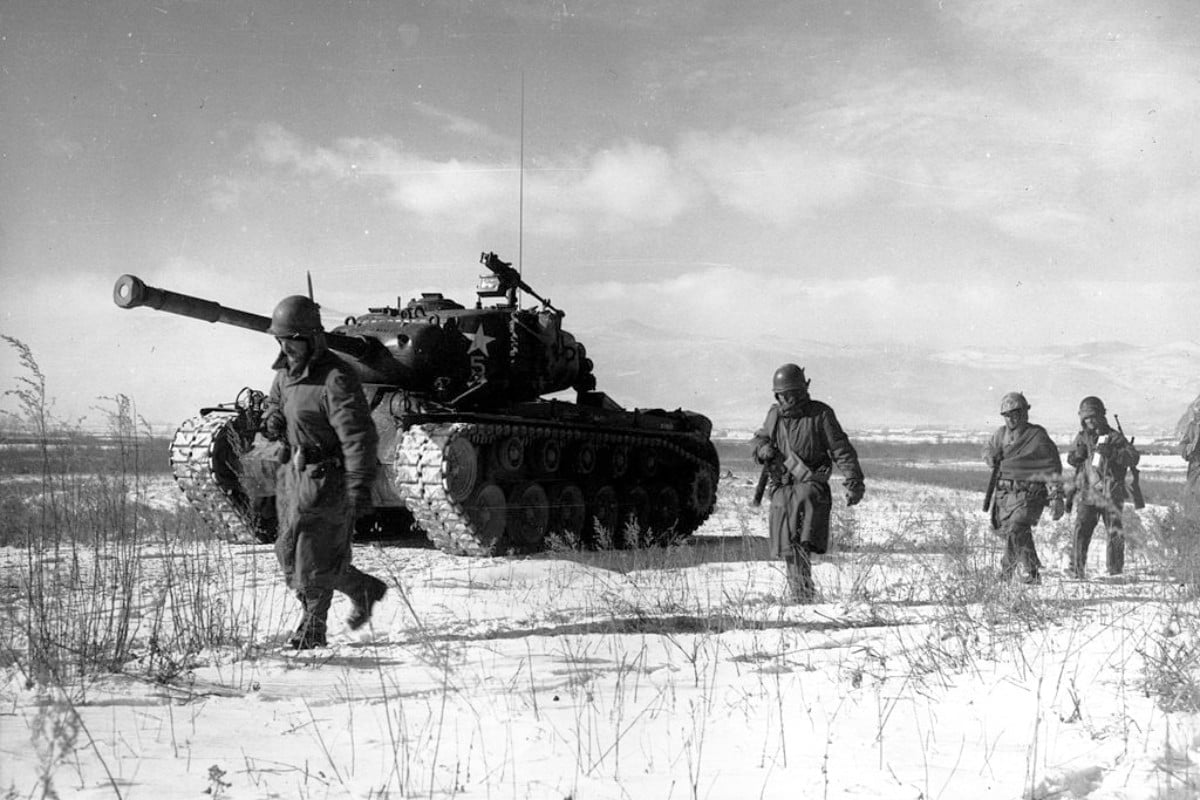40 years ago, on 2 April 1982, war broke out between Argentina and the United Kingdom over the Falkland Islands.
The ruling classes of the two countries hypocritically justified the conflict with phrases about national freedoms, the interests of the Falklanders, etc.
In reality, however, as Ted Grant explains in this pamphlet, published in May 1982, this war was an imperialist one on both sides.
Exposing the cowardice and the half-baked formulas of the labour bureaucracy and of some so-called Marxists, Ted analyses the reason behind the outbreak of the war and its consequences, and puts forward an internationalist Marxist position on the conflict.
We republish below a significant extract from Ted Grant’s 1982 article. Visit marxist.com for the full version.
The war between Britain and Argentina over the Falkland Islands is a symptom of the world crisis of capitalism. The international economic recession has ushered in a new epoch of upheavals, which will mean mighty clashes between the classes and conflicts between the nation states. Class conflicts will interact with national conflicts, aggravating one another.
A Marxist attitude towards war cannot be dictated by the horrors of war, by the suffering and death, or by the nightmare conditions inevitably imposed on both civilians and the ranks of the armed forces.
War merely carries the horrors of capitalism to their ultimate extent. Our attitude towards war is determined by the class interests of those waging the war.
In the modern epoch, wars are determined by the power, profit, and prestige of the ruling classes; and also by the power, income, and privileges of the ruling bureaucracies in the deformed workers’ states of Russia, Eastern Europe, China and the other Stalinist countries.
The working class of all countries has nothing to gain from capitalism and its policies, either in peace or war. War is the continuation of politics by other means. And, nowadays, peace is the continuation of war by other means.
The Marxist attitude is determined by irreconcilable opposition to any war waged by the capitalist ruling class. Our attitude to war between Britain and Argentina is determined by which class is waging the war. On both sides it is capitalist powers which are involved, and therefore we are opposed to the war of both Britain and of Argentina.
Junta’s motives
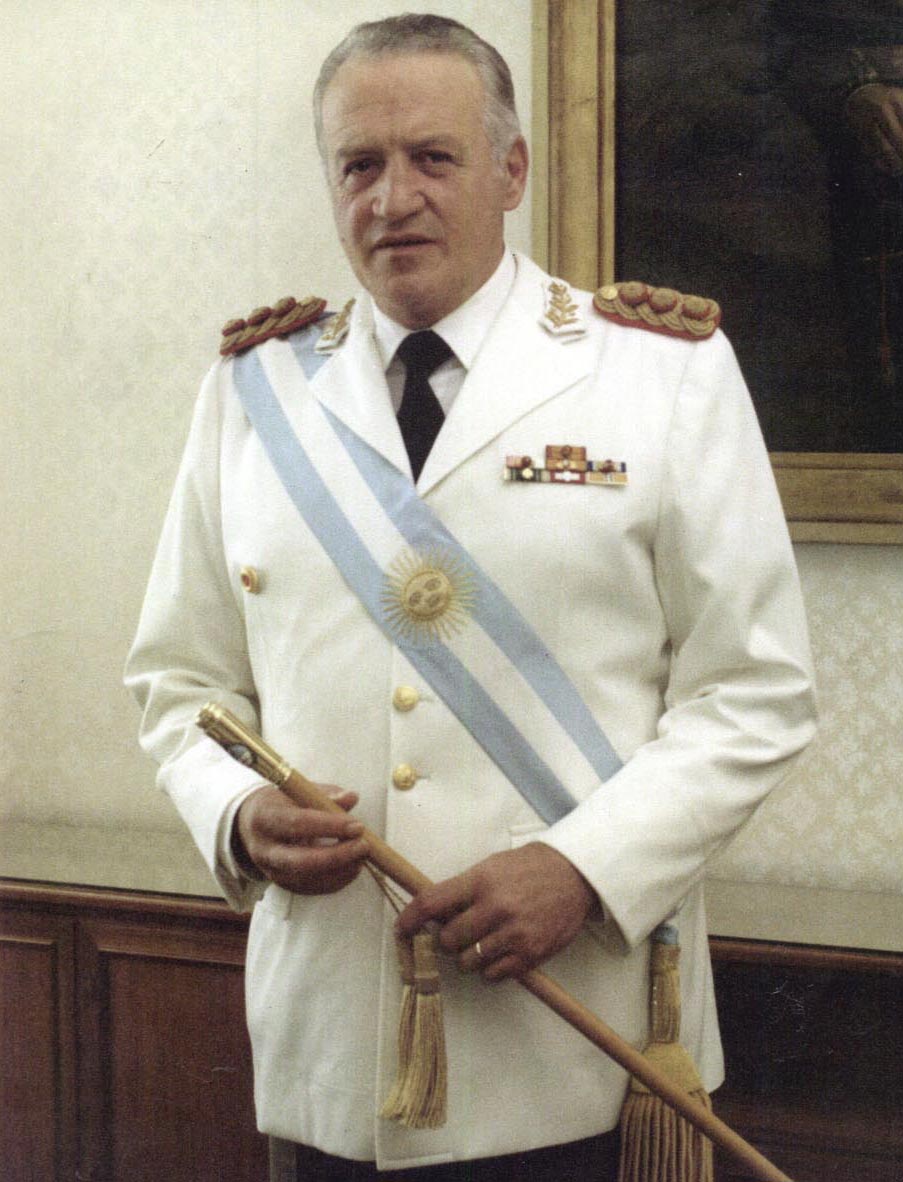
Why has war broken out now? Argentina has laid claim to the Falkland Islands for 150 years, yet has not dared to take action before now. It is the uncontrollable social contradictions in Argentina which have dictated the resort to arms by the Junta, which heads a military Bonapartist regime, using fascist methods. In the same way, it was the social crisis in Germany which pushed Hitler into war.
Lurking under the phrases about ‘national sovereignty’ is the capitalists’ greed for the potentially profitable oil, fish, and mineral wealth of Antarctica. The Junta believes that the exploitation of Antarctica, probably as a junior partner of American capital, would provide the additional support for the Argentine economy and augment the income of big business. They imagine that this would be a means of solving Argentina’s aggravated social crisis.
Even so, that is not the main reason for the seizure of the Falklands. Argentina was facing the beginning of revolutionary developments. Only a few days before the invasion, there were mass demonstrations of the workers against the Junta in Buenos Aires. To escape the social crisis, the Argentinian dictatorship decided on the seizure of the Falklands in a desperate attempt to divert the social strivings of the masses into nationalist channels. This was their calculation.
The mass fervour in Argentina over the seizure of the Malvinas indicates that, temporarily, the Junta has succeeded in diverting the workers’ anger against British imperialism. The Junta’s motives in waging this war, therefore, are determined by capitalist considerations of grabbing resources and escaping from intolerable social contradictions.
Class interests
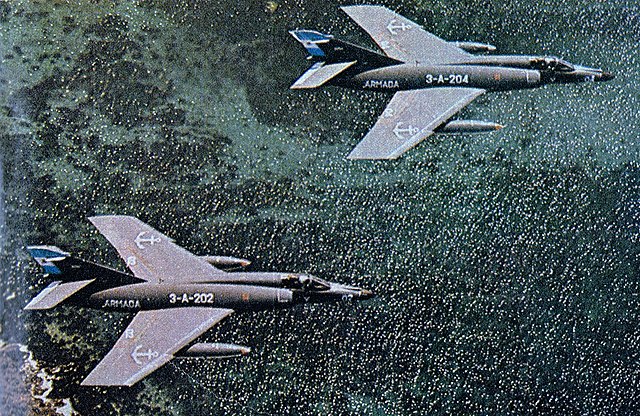
Marxists have always distinguished between wars waged by capitalism and wars waged by a workers’ state, deformed or healthy.
In the Second World War (1939-45), the only country to which the Marxists gave critical support was the Soviet Union. This was in spite of the most monstrous totalitarian dictatorship of the Stalinist bureaucracy, whose privilege and income was based on the state ownership of the means of production and a plan, which they were therefore forced to defend.
The deformed workers’ state in Russia was relatively more progressive than capitalism. A victory for Hitler would have ushered in an entire epoch of counter-revolution. Thus Marxists gave critical support to the war of Russia against Nazi Germany.
They also gave critical support to China, a colonial country in its war against Japan which seized Manchuria in 1931 and engaged in a war with China in 1937-1945. This was despite the fact that the butcher of the Chinese revolution of 1925-27, the Bonapartist dictator Chiang Kai-Shek, controlled China. While supporting China, the Marxists pointed out the complete incapacity of Chiang and the landlord-capitalist regime to wage war on Japan.
In the case of the Second World War, the so-called defence of democracy by the American and European Allies were shot through with hypocrisy and deceit. In reality, they were defending the material interests of the capitalist class. The war was fought for markets, raw materials, colonies, and spheres of influence. The Marxists, therefore, opposed all the imperialist powers in the war.
This, however, did not exhaust the problem – as we will explain in a moment – because of the British workers’ deep-rooted hatred of the Nazis and their support for a fight to defeat the fascist regime.
In 1935-36, Mussolini, Italy’s fascist dictator, invaded Abyssinia (now called Ethiopia) in the interests of Italian capitalism. Despite the existence of chattel slavery in Abyssinia, Trotsky advocated support for Abyssinia in a war of national liberation from the imperialist power out to enslave the country.
The position of the ILP (Independent Labour Party) leaders like John McGovern and James Maxton, advocating ‘no support for either of the dictators’, was rejected by the Marxists.
Marxism always supports the poor, the oppressed, and the enslaved in their struggle against the rich and powerful imperialist states. At the same time, a powerful consideration was that a defeat for the Italian capitalist and fascist invaders would undoubtedly have provoked a proletarian revolution in Italy.
A Marxist attitude can never be determined by the question of who started the war. The labour leaders, both left and right, are obsessed with defining the ‘aggressor’ as a means of determining their attitude. This has led the leaders of the Labour Party into a position where they are trailing behind the Tory government.
The decisive question is: which class is waging the war, and in whose interest? The method of reasoning which starts from who attacked first is completely shallow. There are many cases in history where war has been provoked by one or other power. Our attitude is determined by the class interests of the powers involved in the war.
War and revolution
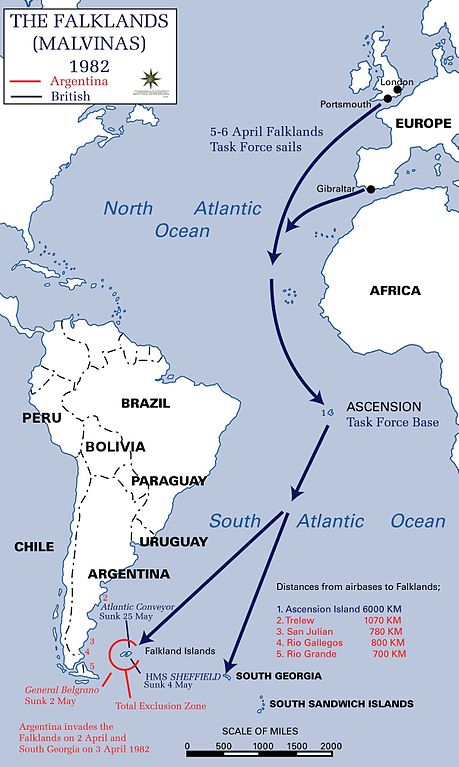
The ultra-left sects of various descriptions have – quite predictably! – supported Argentina on the grounds that it is a colonial country faced with imperialist aggression. That is nonsense, and shows a completely undialectical approach.
Argentina is one of the most highly developed countries in Latin America. Her landowners are not feudal, but bourgeois landowners comparable to the capitalist landowners in Britain.
Eighty-six percent of the population live in the towns, and the country has a reasonably developed industry. Finance capital, both foreign and local, is intertwined with the bourgeois landowners and the capitalists in the cities. Whoever heard of a colonial country with a stock exchange!
The Argentine has a similar basis to that of the United States. The settlers exterminated the local Indian population, and started out with bourgeois relations, rather than those of feudalism; although Argentina, of course, is not as highly developed as the United States.
The regime’s motives are not at all those of defending the rights of the workers and farmers, or rather, agricultural proletariat, but of defending the interests of Argentine big business and the country’s highly developed finance capital.
On the Falkland Islands themselves, the Argentine presence consisted of one Argentine married to a Falkland Islander who fled from the Islands when he saw the possibility of war. Had there been a colony of, say, 100,000 Argentines, a case for colonial oppression could have been made out. But the Islands have been in British possession for 150 years.
There was a fleeting Argentine garrison for only a few months before that, which was expelled by the British. The population of the Islands is English-speaking and of British descent.
Although there are only 1,800 Falkland Islanders, Marxists nevertheless have to take into consideration their rights and interests. The Junta’s claim to the Falklands is purely an imperialist claim for loot in the shape of resources which can be developed – although even this is secondary to their aim of heading off revolution by diverting workers along nationalist lines.
Had the Junta weighed up the chances of successfully taking the Falklands, they would not have struck now, but would have waited for another 12 months. By that time, Britain’s aircraft carriers, frigates, and the vulcan bombers would have been scrapped, and Britain would not have had the means of resisting the seizure of the Islands.
But the hot breath of revolution forced the Junta to act prematurely. The decisive factor was their fear of revolution. And yet, the ultra-left sects are completely unaware of this fact.
The attitude of the Marxists towards this war is decided by all these considerations, and above all by the fact that it is two imperialist powers which are at war – even though the Argentine may in the past have been, like the United States, a colonial country.
Therefore we oppose the capitalist war of Argentina against Britain. And we oppose the capitalist war of Britain against Argentina.
In this war, a defeat for Argentina will provoke the revolution. If the Task Force is defeated, on the other hand, it will mean the downfall of the Thatcher government. Either result would be in the interests of the working class internationally.
British imperialism’s position cannot benefit the working class. Its reaction to the seizure of the Falklands is dictated by considerations of prestige, and also by the wealth of Antarctica and the oil and fish around the Islands themselves. The Falklands are the gateway to Antarctica, and South Georgia is the entrance to the Southern Polar Continent.
If Britain takes back the Islands, British capitalism will then begin to develop the resources of the Antarctic, particularly around the Falklands, in a measurable period of time. These are the real war aims of British capitalism. Like all regimes, including that of the Argentine, they are interested in power, profits, privilege, and prestige – and that is what dictates their policies.
Reformism and pacifism
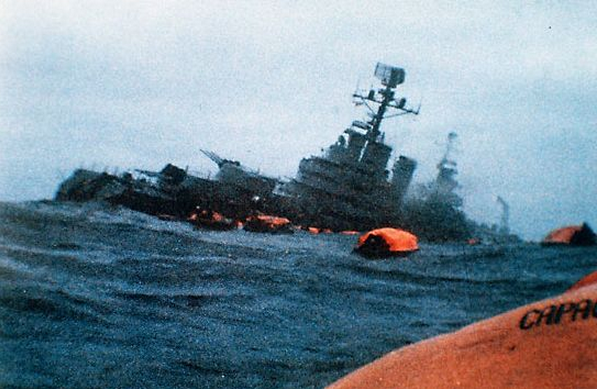
As always, the right-wing labour leaders have come out in support of British capitalism and imperialism in its hour of need. The parliamentary leaders of the Labour Party gave immediate support to the sending of the Task Force and the seizure of South Georgia.
Foot and Healey have compromised themselves with the Tories. Their opposition is of the faintest character, completely lacking the realities of a class opposition. While supporting the sending of the Task Force, they still insist on a diplomatic solution to resolve what is now insoluble except through the ‘arbitration’ of force. Neither side can back down.
If the Junta were to relinquish the Falklands, it would face immediate downfall and would even prefer the risk of defeat in war. The Thatcher government is in the same position. Acceptance of defeat would mean the collapse of the government, and the ruin of British imperialism’s diplomatic power.
The opposition in the Labour Party of Tony Benn and others, is, in reality, purely pacifist. Tony Benn has put a very courageous position, but without thinking things through to a conclusion.
Their opposition towards war will have some effect on the active layers of the Labour Party.
Within the Labour Party there is a strong instinctive hatred of war, and a big majority of the active workers have a hatred of the Tory government.
But the pacifist opposition of the labour lefts is not opposition to the class which wages the war; and nor is it directed against the aims of that class in waging a war. It is futile opposition which, once the war takes on bigger dimensions, can play into the hands of the imperialists.
Empty slogans
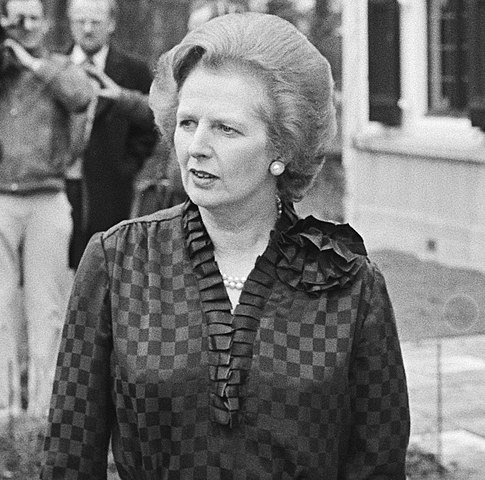
The demand for the ‘withdrawal of the fleet’, first put forward by the so-called ‘Communist’ Party, and then echoed by Tony Benn and other Labour left-wingers, is a meaningless, pacifist gesture. Naturally, the sects enthusiastically follow the Communist Party into this pacifist blind alley.
How could the demand for the fleet to be withdrawn be accomplished? By asking Thatcher? She would merely shrug her shoulders and laugh.
Throughout history, pacifist demands, to ‘stop the war’, to halt military mobilisation, or to withdraw the fleet, have never had any effect. The Communist Party is too cowardly, and the sects too stupid to think things through to a conclusion.
In order to get the fleet withdrawn, a general strike would be required; and not only a general strike, but also an insurrection. There would be no other means of attaining it.
But such demands could get no echo from the mass of workers, or from any section of the labour movement. It would be ludicrous to put forward such demands.
It is true that no war could be waged without the support of the trade union and labour leaders. But most of them are actually supporting the action of the Thatcher government.
It would be absurd to call for a general strike at the present time. But this means that the call for withdrawal of the fleet is even more absurd.
Marxists do not put forward slogans which are meaningless. And they do not put forward ideas that will not raise the level of the active layers of the labour and trade union movement and of the working class as a whole.
The United Nations
The second line of defence, however, for both the right and the left trade union leaders, is to appeal to the United Nations, which should really be called the dis-United Nations.
The whole history of the post-war period has indicated that the United Nations can only solve secondary problems, which are of secondary consideration to the states involved. If the superpowers and other powers are united, perhaps some issues can be resolved. Even then, however, it will not be successful if one of the parties is strong enough to flout the (dis-)United Nations.
Since the end of the Second World War, there has been a series of wars of a ‘minor’ type that the United Nations has been unable to prevent or bring to a halt. In fact, since 1945 there have only been about 17 days of peace. There has been a war, or civil war raging, mainly in the third world, every day. The United Nations has been powerless to prevent them.
The United Nations is composed of imperialist powers, the Stalinist deformed workers’ states, and the ex-colonial countries. They are inevitably riven with national and class antagonisms.
If there is a unity of gangsters, does it mean that if one gangster falls out of line, there will not be a gangster conflict? The history of the Mafia in Italy, and the Chicago gangsters in America, shows that a union of gangsters breaks down the moment one of them finds that his interests are not being served by an uneasy agreement.
The General Assembly of the United Nations can no more serve as a classless, impartial assembly, than the parliaments or assemblies of the member states, which are themselves divided into classes or ruled over by privileged elites.
The major powers which form the Security Council, moreover, each have a veto and can vote down any action, or even declaration, by the United Nations.
The attitude of the labour leaders on this question stems from the failure to understand that society is divided into classes, and also divided into nations, on which those classes are based. The class struggle is both national and international.
Marxists explain that the labour movement must understand that it can no more have any confidence in the Tories’ foreign policy than it has in the Tories’ home policy. Foreign policy is the continuation of home policy – it is based on exactly the same class considerations.
Role of the Marxists
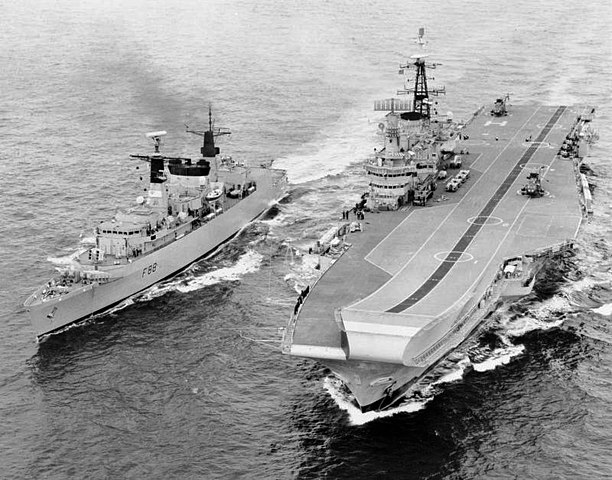
In Argentina, the role of the Marxists must be skillfully to oppose the war. They will expose the inconsistencies of the Junta, showing the mess which the capitalist officer caste have made of the economy.
The Junta has, temporarily, been able to divert the Argentine masses on nationalist lines. But the Marxists will demonstrate the incapacity of the officer caste to fight a revolutionary war, without which it is virtually ruled out that Argentina could defeat Britain, which is still a relatively powerful imperialist power.
Why does the Junta fight with kid gloves? The Argentine capitalists, on whose interests the Junta rests, are linked to American and British finance capital. Marxists in the Argentine will demand the expropriation, first of British investments, and then of all foreign capital in the country.
The Marxists would explain that victory over the powerful imperialist Britain could not be gained by military means, especially under the direction of the totalitarian Junta, but only through political and social means.
An overthrow of the Junta by the workers and the establishment of a socialist Argentina would be the most powerful weapon against all imperialism, especially British and American.
The Argentine working class could then appeal to the labour movement and the workers and soldiers of Britain. The workers of Argentina would then suggest a socialist federation of Argentina, the Falklands, and of a socialist Britain.
A socialist government in the Argentine would then point out that the Falklands issue has been magnified out of all proportion by generations of Argentine capitalists for their own ends.
They would appeal to the workers of all Latin America to overthrow the economic yoke of capitalism and imperialism, and to overthrow their own Juntas, and to prepare for a socialist federation of Latin America.
Thatcher and the Tories pretend that the Falkland Islanders and their wishes are their first consideration. In reality, it is the last thing they are concerned about.
If it were in the interests of British imperialism, they would sacrifice the interests of the Islanders without blinking an eyelid. It is the prestige of British imperialism and the prospect of exotic riches in the Antarctic, not the interests of the Islanders, which determine the policy of the Tory government.
The Second World War supposedly broke out over the city of Danzig, which was seized by force by the Nazis. In reality, however, it was considerations of markets, raw materials, colonial possessions, and spheres of influence which were the main cause of the war.
The Junta miscalculated completely, aided by the miscalculations of the British Foreign Office. But the social contradictions have propelled them into war, and they have no other way out.
The bloody equation of war is incalculable. While it is almost certain that there will be a victory for British imperialism, it is not absolutely certain that this will be so.
The defeat of the Junta would have enormous consequences and would promote revolution in Argentina. A defeat for Britain would have enormous social consequences here, too, and would mean the collapse of the Tory Party.
Whatever the outcome, the Marxists – with a correct approach towards the war and the feelings of the workers in Britain – will gain.
A correct orientation towards the working people in Argentina is also of decisive importance. The sectarians will remain stewing in their fantastic mish-mash of absurd slogans and spurious explanations, and will gain nothing, except perhaps a few odd-balls.
A Marxist approach towards the war could result in a great increase of support for the genuine forces of Marxism. We are the only section of the labour movement which has a clear understanding: first of war in general, and the war over the Falklands in particular; and, second, of how to approach the working class and other exploited strata and win them to Marxism in the event of war.

